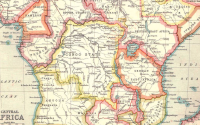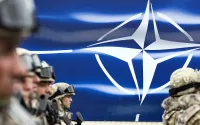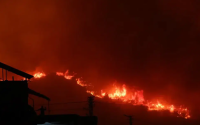23 September 2004Znet / Ha'aretz Daily
The screaming and shouting by opponents of disengagement and the settlement lobby is creating an image of the prime minister being a man of the political center. Their threats and accusations are painting him with the colors of a persecuted peacemaker, so much so that kibbutzniks in the north are joining the Likud to help the man who sprang forth from their very tradition of farming the land, Ariel Sharon. That may be marginal, but it says something about the sympathy on that part of the electorate that regards itself as moderate, and supports a political compromise with the Palestinians and a two-state solution.
Support and sympathy from parts of the Israeli peace camp for the disengagement is a dangerous part of the plan because it enables Sharon and his partners in his world view to continue executing their real plan and to do so without public criticism, without protests, without effective opposition. Their goal is control over as much of the West Bank as possible, without Arabs or with as few Arabs as possible, and the continued expansion of settlements that separate Palestinian population centers from each other. In that vision, the Palestinians are not a nation with national rights over their land, which is entirely under Israeli control, but a collection of individual communities, and the Israeli ruler is preparing a different future for each one of those communities: two of them, in Gaza and the northern West Bank, will soon enjoy an Israeli "withdrawal."
Sharon himself has made openly clear his intentions in the disengagement plan. As he said in the Rosh Hashanah issue of Yedioth Ahronoth, the disengagement "frees Israel from pressure to adopt one or another plan that would have been dangerous for it. I don't see the terror coming to an end ... [Bush] promised there won't be any pressure on Israel to accept any plan other than the road map. And I don't see the Palestinians doing their part in the road map. It is very possible that after the evacuation, for a very long period there won't be anything else ... there has to be a change in Palestinian strategy, and there is not even the smallest sign of such a change. Israel will continue its campaign against terror and will remain in the territories after the execution of the disengagement."
In other words the essential elements of disengagement include Sharon counting on Palestinian terror. Moreover, he is counting on the durability of the prevailing Israeli view that Palestinian terror has nothing to do with the occupation policies and the Israeli control over Palestinian lives. His plan is based on American support, which will guarantee, despite reservations, American and European financing. Sharon's plan precludes any negotiations or even pretense of negotiation over a permanent political deal with the Palestinians. And Israel remains in the West Bank, which means the army remains, along with arrests, checkpoints, assassinations, settlement expansion, more bypass roads, subsidies for Jewish settlers, land expropriations, and deforestation of Palestinian orchards and groves - the very substance of what many Israelis believe has nothing to do with Palestinian terror.
Since Sharon's working assumption is that "the terror will continue," Israel will leave all the existing security measures around Gaza that exist now, for an unlimited time. The Strip will remain cut off from the West Bank. Israel will not only control the border crossings at Karni and Erez, but also at Rafah. As exists now, control over the Allenby Bridge will guarantee that Gazans cannot enter the West Bank though Jordan. Thus, the freedom of movement for Gazans and their ability to leave the Strip will remain entirely in Israeli hands, meaning that freedom of movement will be severely limited, as will be the freedom of journalists, diplomats and political activists to enter Gaza.
Israel will guarantee that its merchandise will continue to flood the Strip, even though Palestinian workers will no longer be working inside Israel. Israeli control over freedom of movement will block Gazan products and produce from reaching West Bank markets - as it does now - and vice versa. It will deter potential investors, who have learned the bitter lessons of the Oslo years: the chances of new industry to succeed depends on freedom of movement of workers, trainers, engineers, merchandise, equipment and know-how.
The disengagement, therefore, will not guarantee the residents of Gaza any recovery out of chronic poverty, and the main element in the plan is the expectation that foreign countries will continue to donate money to the Palestinians. In other words, they will be charitable organizations that will continue sending food and medicine.
The disengagement plan will lead to Gazans being disconnected from the world and the rest of the Palestinian people. It will create a static market, retard social and cultural development, and create a sense of insult for all those who depend on charity. The Palestinian people will perhaps live in a different reality, but will regard itself as a nation living under various forms of Israeli occupation. Therefore, there won't be any lack of people in Gaza, the West Bank and the rest of the world who will plan and conduct armed retaliation against that occupation.






